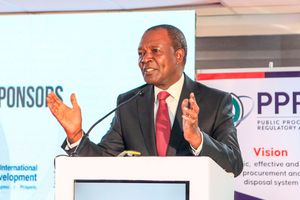
President William Ruto addressing journalists at State House in Nairobi on July 5, 2024.
Legal experts have raised questions over some aspects in the raft of measures President William Ruto announced on Friday as a way of funding the budget following the rejection of the Finance Bill, 2024 after sustained public protests.
They questioned whether the President had powers to execute some of them; noting that some measures seemed to quash already existing laws, while others are either in existence or have not been implemented over the years.
The experts said the President does not have sweeping powers to scrap 47 State Corporations — one of the measures he has announced.
The other changes he has proposed are formation of a taskforce for the forensic audit of public debt, suspension of appointment of Chief Administrative Secretaries (CASs), barring of State officers from participating in harambees, no extension of term of service for civil servants that have attained 60 years, removal of confidential budgets and reduction of advisers by half.
Constitutional lawyer Bob Mkangi told Sunday Nation that there are legal questions on how the proposals announced by the President are going to be implemented. He said that laws for dealing with public debt already exist, and questioned the logic of another body being formed to execute the same function. He said that is duplication of roles which the public wants eradicated.
Duplicating duties
“There are laws and institutions that already exist. The only justification to either create another institution or law is when there are gaps, otherwise we will be duplicating duties, something we are trying to cure,” Mr Mkangi said.
On the scrapping of State Corporations, he said that while we need to do away with some agencies which are being sustained by taxpayers, this is the mandate of Parliament.
“They were created by an Act of Parliament, and they can only be scrapped through the same channel,” Mr Mkangi said.
On the issue of CASs, he said the President should have expunged the existing law that legalised their appointment.
“The fact that he just suspended the appointments means he can still hire them in future. He could have done more by saying the law should be expunged. In the first place, the positions had been declared unconstitutional,” he said.
In March, Members of Parliament approved the creation of the position of CASs. While passing the National Government Laws (Amendment) Bill 2023, the MPs also removed the initial cap of CASs that the President can appoint from the initial cap of 22 to “as many as required”.
The Head of State had nominated 50 CASs before the courts declared the position unconstitutional.
Public debt
The Law Society of Kenya (LSK) also questioned the President’s move on the formation of a taskforce for forensic audit of public debt, terming it unconstitutional. LSK said the mandate of auditing public debt rests with the office of the Auditor-General as stipulated under Article 229(4) of the Constitution.
“It is our considered view that the establishment of the taskforce is unconstitutional. The mandate to audit public debt rests with the office of the Auditor-General,” LSK said through its chief executive office, Florence Muturi.
The body said that LSK President Faith Odhiambo, who was appointed to chair the taskforce, will not take up the position, as it warned Dr Ruto against usurping the constitutional powers of the Auditor-General through Executive Orders.
The lawyers’ association also told President Ruto that the Public Debt Management office, which is funded by taxpayers, should provide details of public debt to the Auditor- General for forensic audit.
Scarce public resources
“It is essential not to squander scarce public resources by appointing a presidential taskforce to perform duties of existing public offices,” Ms Muturi said.
Even as the President was proposing the formation of a taskforce, there already exists the office of Directorate of Public Debt Management that is headed by a director-general who reports to the National Treasury Cabinet Secretary. This department is tasked with minimising the cost of public debt management and long-term borrowing, taking account of the risks.
It also promotes the development of market institutions for government debt securities and ensures the sharing of the benefits and costs of public debt between the current and future generations.
Lawyer Soyinka Lempaa echoed the same sentiments. He said that State Corporations are created by an act of Parliament and can only be abolished through a repeal of the Acts.
“The work of repealing Acts of Parliament is the preserve of Parliament. So Ruto’s utterances that he had dissolved 47 State Corporations, sending employees home thereof is a red herring, a wild goose chase and hot air,” said Mr Lempaa.
He also warned that terminating contracts of officers above 60 years will attract legal actions from the affected persons as it goes against the Employment Act and Article 41 of the Constitution.
Article 41(1) of the Constitution of Kenya provides that every person has a right to fair labour practices.
On reducing advisers by 50 per cent, the Public Service Commission (PSC) already has a policy which stipulates that each CS is entitled to two. However, it is not clear how many advisers work for the government.
Despite the PSC guidelines, the President Ruto has six advisory units with a number of advisers who earn Sh1.1 billion each financial year.
Regulation 27 of the Public Service Commission gives the PSC responsibility for appointment advisers for the President, the Deputy President and Cabinet Secretaries. The advisers are identified and recommended by a specified State officer.
Public service jobs
A report by the National Assembly Committee of Labour on its consideration of the Public Service Commission (Amendment) Bill, 2023 tabled in Parliament in October last year, 405 officers in ministries and State departments are still occupying plum public service jobs despite attaining the mandatory retirement age of 60 years.
The report indicated that as at June 2023, there were 75,031 employees in the civil service, out of which 405 have attained retirement age, but are still on the job.
The PSC told the committee that there are six fields with individuals who possess rare skills who are retained in the public service. The fields are; marine engineers and coxswains, pilots, aircraft accident investigators, artists and officers with extensive experience.
In some quarters, the President’s announcement on austerity measures appears to be lip service, as last year he announced during the State of Nation address in Parliament various measures that would have saved the public Sh300 billion. However, nothing was implemented.
“I have news, and it is not very good news. Our financial situation is not very good,” the President told MPs.
“To this end, I have instructed the National Treasury to work with ministries to find savings of Sh300 billion in this year’s budget. Next year, we will bring it further down so that the third year, we have recurrent budget surplus,” he added.
Areas that were targeted were allowances, hospitality, and unnecessary foreign trips.










